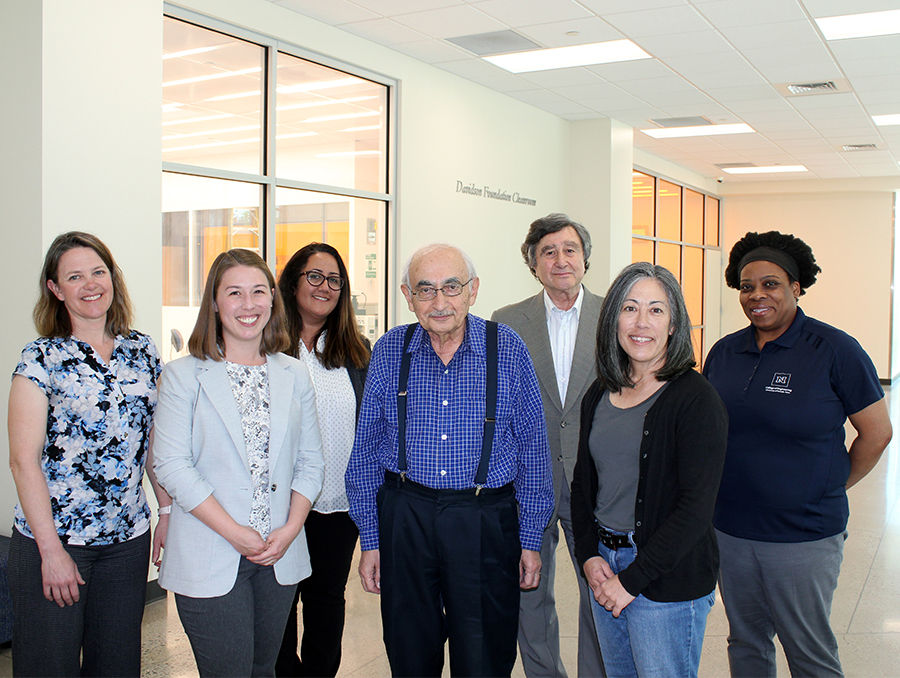A crowd of more than 200 faculty, staff and students braved the biting wind and cold rain that pounded Reno on Friday to learn more about the University's budget reduction plan mandated by Gov. Jim Gibbons' call for a 4.5 percent cut of state budgets.
The informal question-and-answer session in Room 2030 of the William Raggio Building was led by President Milton Glick, who stressed that although budget cuts are never easy, in the end, "We will be a better university for this."
"What do we do to minimize the damage?" Glick said of the University's plan to reduce or reallocate its budget by about $21 million. "We need to take enough money that we solve this problem. As bad as it is to face budget cuts, it's worse to have to do it again." Glick added later: "My goal is short-term pain for long-term gain."
Glick noted that in a very short period of time, the University's administrators have worked to create a budget reduction plan that 1) protects student programs and student success; 2) protects the University's research infrastructure; 3) protects jobs where possible; 4) doesn't rely on across-the-board budget cuts.
"Everything else is important," he said of other campus priorities, "but less important than these."
Glick made it clear that although the plan has been the product of many people, ultimately the success or failure of the plan will lie with him.
"If you don't like the decisions, blame me," he said.
Glick said he has been impressed by the way leaders on the campus have responded. Foremost on almost everyone's mind, he said, was an overwhelming feeling that student programs and course offerings must be protected.
"We not only will have the same number of classes (for the upcoming spring semester), we will have more courses," Glick said, noting that Paul Neill, director of the Core Curriculum Office, will be serving as a "course concierge" and will work with deans and student services staff to ensure that, "if a student can't get in to a course they need, we will find a way for them to get in. ... Probably 80 percent of our students don't know how to do this. We'll have someone who is publicly available and can intervene for them so they can get in."
Glick also applauded the University's student leadership for their efforts to help deflect some of the budgetary pain. ASUN and GSA leadership have endorsed implementation of a surcharge equivalent to $5 per-credit per semester for three semesters. The students also plan to bring a proposal to the Board of Regents by April 2008 for a special fee for ASUN/student activities.
"Our students have stepped up and are saying, ‘The faculty are contributing, and we are going to contribute, too,'" Glick said.
During the question-and-answer period, Richard Mason, an associate professor of accounting and information systems in the College of Business Administration, wondered about the students' role in helping the University with the budget crunch.
"The students didn't cause this problem," he said. "I don't think we should slap the students with this."
Glick agreed that Mason was right in that the students hadn't caused the state's budget crunch.
"But I don't think they're being punished," Glick said, noting that the University "is one of the best bargains in the country" with tuition at about $3,500 per year with a high-quality faculty, with many of the students benefiting from the state's Millennium Scholarship program. Glick added that student leadership has also been receptive to a tuition increase, with the pre-condition that an increase in tuition should bring an increase in the institution's overall quality.
Other budget cut points made Friday:
Gerontology, Mining Engineering status: Glick emphasized that certain programs which had been highlighted in the plan for a reduction in state funding, such as the Gerontology Academic program and Mining Engineering, were not being eliminated. For Mining Engineering, the University has already reached out to the mining industry to "to help put dollars back in to help with the costs" of the program. For Gerontology, he said that a restructuring will help ensure that advising will continue.
Delay of the opening of the Mathewson-IGT Knowledge center until July 2009: "The library is down seven librarians," Glick said. "We are now talking about opening a building that is twice as big (as Getchell Library) and starting down seven staff. ... We think to open that building without adequate staffing and without adequate budget will tarnish it."
Suspending searches for faculty and classified positions to be filled prior to July 1, 2008: "Our goal is to not complete searches where employment begins before July 1," Glick said, "but protect searches for the fall." Amplifying the point further, Glick said that the goal by doing this will be to put more power in the hands of the colleges themselves. "If we can get our budget right-side up, my goal is for the president and the provost to make macro decisions but not micro-manage the colleges," he said. "Right now, that's what we're having to do. It's much better if we position you to let you do your jobs."
On the Board of Regents' reaction to the budget plan, which will be formally presented during a special meeting on Monday in Las Vegas: "I would hope they either will reject all of it or accept all of it," Glick said. "If they reject part of it, then they are in the business of running a university, which I don't think they want to do. Now, if they make suggestions, ‘We are really worried about X,' then that's fair. We want the Regents to focus on outcomes; it's their responsibility to tell us what they expect from our University."
In an e-mail to the campus following the meeting sent on Friday afternoon, Faculty Senate Chair Stephen Rock noted that input on the plan is still being sought:
"If you have concerns or questions about the budget proposal, I would encourage you to take the president up on his offer and contact him (glick@unr.edu) directly," Rock wrote in his e-mail. "You are always welcome to contact me as well (rock@unr.edu). The Faculty Senate will continue to work with the President to ensure that faculty have a voice as the process continues. As with any reorganization, the Senate will conduct a formal review of the proposed College of Health and Human Sciences restructuring.
"Bill Follette (Senate Chair Elect) and I will be attending the Board of Regents meeting on Monday. We will address the Regents on the budget plan and will voice our support for the delay in merit as part of the overall plan for UNR. If you have suggestions on issues we should raise with the President or the Regents, please feel free to contact me. It will help the university during this time of budget cuts for the President and the Faculty Senate to have a consistent message."











